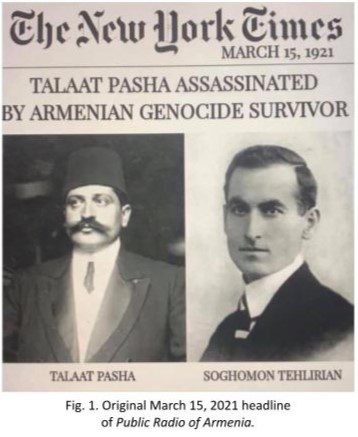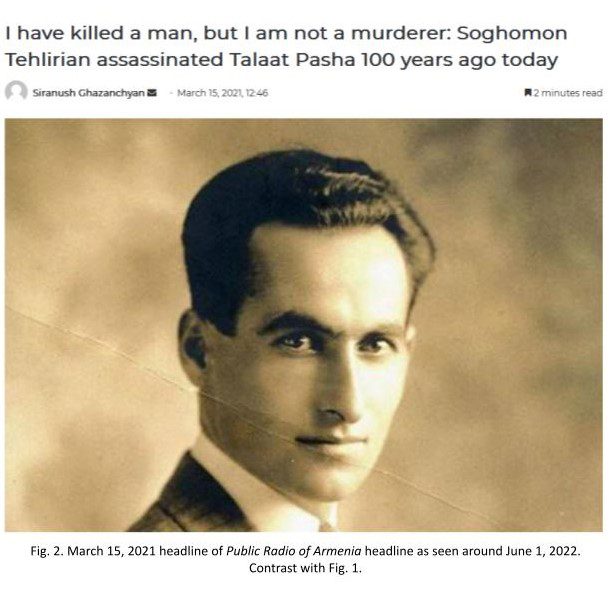Ferruh Demirmen, Ph.D.
Public Radio of Armenia, one of the largest broadcasters in Armenia, and which also acts as a news outlet on the Internet, evidently cannot resist fakery as it advocates “Armenian genocide.” In its March 15, 2021 edition, the news outlet featured the assassination of Mehmet Talaat Pasha, the Ottoman Minister of Interior Affairs, on March 15, 1921 in Berlin by a young Armenian named Soghomon Tehlirian. The news outlet used the anniversary of the assassination as an opportunity for a propaganda hit to publicize “Armenian genocide.”
But as revealed by this author, the news coverage exposed a shameful fakery.
Fig. 1 shows how the headline appeared when the article was first published on March 15, 2021.

The headline was a fraudulent reproduction of the headline of the news coverage by the Berlin (March 15) and New York (March 16) offices of The New York Times. There was no resemblance between the fake headline and the actual Times headlines.
Most notable, was that the fake headline contained the word “genocide” – a term that did not exist until the Polish lawyer Raphael Lemkin coined it in 1944. The Times headlines of the Berlin and New York offices did not contain the word “genocide.”
The fakery prompted this author to write to the Times on March 23, 2021 to inform the newspaper of the fakery by providing the images of the actual and faked headlines. It was left to the judgment of the newspaper as to whether to take action vis-a-vis the fakery, including a stern warning or legal action, if need be. At the very least, Public Radio of Armenia had deceived its readers and breached journalistic ethics The newspaper did not respond.
This is where the situation stood until this author happened to re-visit the same news coverage around June 1 (2022): . Most surprisingly, although the news Internet link had not changed, the headline had changed as shown in Fig. 2.

The fake headline had disappeared, and there was no explanation as to the reason. One explanation for the change was that the Times had contacted the publisher and demanded correction, possibly under threat of a lawsuit.
The other explanation is that the publisher took note of this author’s Diplomatic Observer article and took its own initiative.
However, there was more surprise. When the same news coverage was visited around end-June (2022) through the same Internet link, both the fake (Fig.1) and the corrected headline (Fig. 2) appeared. The publisher somehow could not resist re-invigorating the fake headline.
The over-all impression was that, the publisher was simply making mockery of the truth, and playing games with the readers. One wonders whether the Times is aware of such disrespectful behavior.
But the bigger question is: Why did Public Radio of Armenia resort to the shameful deception in the first place? Deception by Armenian sources as to the alleged “Armenian genocide” is not new, e.g., the “Andonian telegrams,” the “Hitler quote,” the “pyramids of human skulls,” the ECtHR Switzerland-Perinçek “victory verdict,” and the alleged Subatan (Kars) massacre, which in fact is the savagery inflicted by Armenian militants on Muslim civilians. Evidently the best way to propagandize a falsified “Armenian genocide” is through fake news!


Leave a Reply